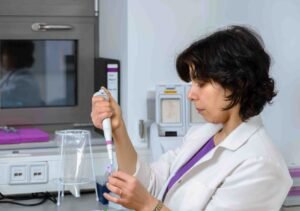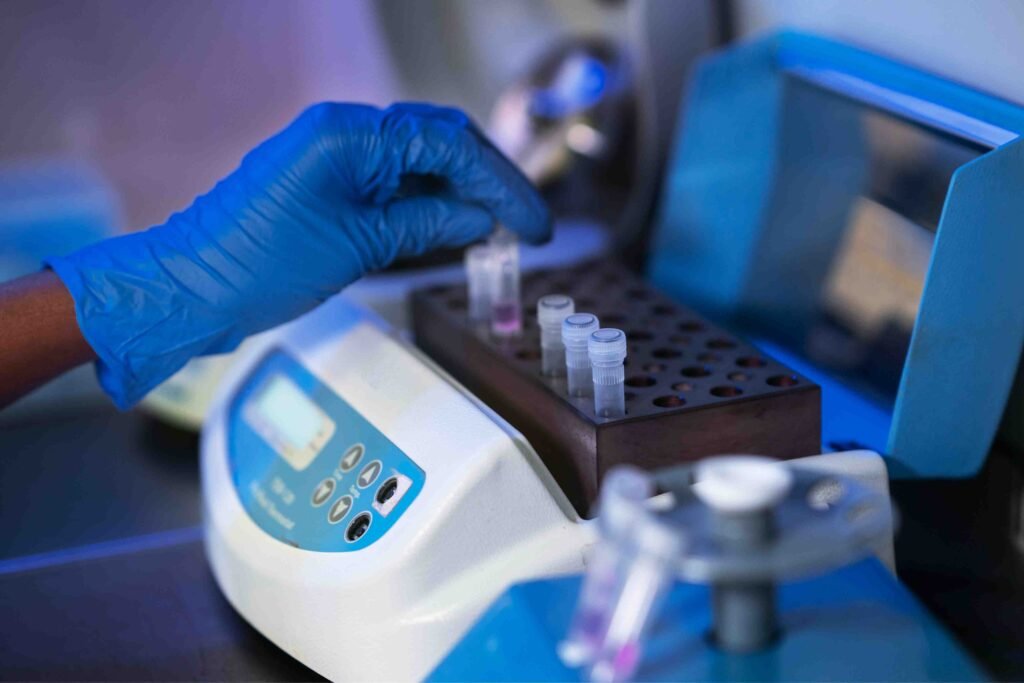A Comprehensive Guide On Genetic Testing in IVF
In vitro fertilization (IVF) has been a beacon of hope for many couples struggling with infertility. This assisted reproductive technology involves combining eggs and sperm outside the body to create embryos, which are then implanted in the uterus. One of the most significant advancements in IVF centres in Bangalore is the integration of genetic testing, which can improve the success rates of this procedure and ensure the health of the baby. In this comprehensive guide, we will delve into the various aspects of genetic testing in IVF, including its types, benefits, procedures, and ethical considerations.
Understanding Genetic Testing in IVF
Genetic testing in IVF involves analyzing the genetic material of embryos before they are transferred to the uterus. This helps identify any genetic abnormalities that could lead to implantation failure, miscarriage, or congenital disabilities. By selecting embryos with the best genetic health, the chances of a successful pregnancy and the birth of a healthy baby are significantly enhanced.

Types of Genetic Testing in IVF
Preimplantation Genetic Testing for Aneuploidy (PGT-A):
- Purpose: PGT-A screens embryos for chromosomal abnormalities. It checks for the correct number of chromosomes, which is crucial because an abnormal number can lead to conditions like Down syndrome, Turner syndrome, and miscarriages.
- Procedure: A few cells are biopsied from the embryo, and their chromosomal content is analyzed. Only embryos with the correct number of chromosomes are selected for transfer.
Preimplantation Genetic Testing for Monogenic Disorders (PGT-M):
- Purpose: PGT-M is used when one or both parents carry a known genetic mutation that could be passed on to their children. It screens for specific genetic disorders such as cystic fibrosis, Huntington’s disease, and Tay-Sachs disease.
- Procedure: Embryos are tested for the specific genetic mutation. Only embryos without the mutation are selected for transfer.
Preimplantation Genetic Testing for Structural Rearrangements (PGT-SR):
- Purpose: PGT-SR detects structural chromosomal abnormalities such as translocations, inversions, or deletions. These abnormalities can lead to implantation failure, miscarriage, or congenital disabilities.
- Procedure: Similar to PGT-A, embryos are biopsied and analyzed for structural rearrangements. Only embryos with normal chromosomal structures are chosen for transfer.
Benefits of Genetic Testing in IVF
- Increased Success Rates:
Genetic testing improves the chances of a successful pregnancy by ensuring that only genetically healthy embryos are implanted. This reduces the risk of miscarriage and increases the likelihood of a live birth.
- Reduced Risk of Genetic Disorders:
By screening for specific genetic mutations, genetic testing can prevent the transmission of inherited genetic disorders. This is particularly beneficial for couples with a family history of genetic diseases.
- Informed Decision-Making:
Genetic testing provides valuable information about the genetic health of embryos, enabling couples to make informed decisions about their reproductive options. This can reduce the emotional and financial burden associated with repeated IVF cycles.
- Peace of Mind:
Knowing that the embryos selected for transfer are genetically healthy can provide peace of mind to prospective parents, alleviating concerns about potential genetic disorders.

The Genetic Testing Procedure
- Ovarian Stimulation:
The IVF process begins with ovarian stimulation, where fertility medications are administered to stimulate the ovaries to produce multiple eggs. This increases the chances of obtaining a sufficient number of viable embryos for genetic testing.
- Egg Retrieval:
Once the eggs are mature, they are retrieved from the ovaries using a minimally invasive procedure called follicular aspiration. This involves using a thin needle to extract the eggs from the ovarian follicles.
- Fertilization:
The retrieved eggs are fertilized with sperm in the laboratory, either through conventional insemination or intracytoplasmic sperm injection (ICSI), where a single sperm is injected directly into the egg.
- Embryo Culture:
The fertilized eggs, now embryos, are cultured in a controlled environment for several days until they reach the blastocyst stage (typically five to seven days after fertilization).
- Embryo Biopsy:
At the blastocyst stage, a few cells are carefully removed from each embryo for genetic analysis. This biopsy does not harm the embryo and is performed using advanced micromanipulation techniques.
- Genetic Analysis:
The biopsied cells are sent to a specialized genetic laboratory, where they are analyzed for chromosomal abnormalities, specific genetic mutations, or structural rearrangements, depending on the type of genetic testing being performed.

- Embryo Selection:
Based on the genetic analysis results, embryos with normal chromosomal content and free of specific genetic mutations are selected for transfer. The healthiest embryos are chosen for implantation to maximize the chances of a successful pregnancy.
- Embryo Transfer:
The selected embryos are transferred to the uterus in a procedure called embryo transfer. This is a relatively simple and painless procedure that involves placing the embryos into the uterine cavity using a thin catheter.
- Pregnancy Test:
Approximately ten days to two weeks after the embryo transfer, a pregnancy test is performed to determine if the procedure was successful.
Ethical Considerations and Concerns
While genetic testing in IVF offers numerous benefits, it also raises several ethical considerations and concerns:
- Genetic Discrimination:
There are concerns about the potential for genetic discrimination, where embryos with certain genetic traits might be unfairly selected or discarded. This raises questions about the ethics of “designer babies” and the societal implications of genetic selection.
- Psychological Impact:
The process of genetic testing and embryo selection can be emotionally challenging for prospective parents. The knowledge that some embryos carry genetic abnormalities can be distressing, and the decision-making process can be fraught with anxiety and ethical dilemmas.
- Access and Equity:
Genetic testing in IVF can be expensive, potentially limiting access for couples with limited financial resources. This raises questions about equity and fairness in access to advanced reproductive technologies.
- Accuracy and Limitations:
While genetic testing is highly accurate, it is not infallible. There is still a small chance of false positives or false negatives, which can lead to incorrect conclusions about an embryo’s genetic health.
- Regulation and Oversight:
The regulation and oversight of genetic testing in IVF vary by country and region. Ensuring that these practices are conducted ethically and responsibly requires robust regulatory frameworks and professional guidelines.

Future Directions and Innovations
The field of genetic testing at IVF centres in Bangalore is continually evolving, with ongoing research and technological advancements promising to enhance its accuracy and efficacy. Some future directions and innovations include:
- Non-Invasive Prenatal Testing (NIPT):
NIPT involves analyzing fetal DNA circulating in the mother’s blood during pregnancy. This non-invasive method could potentially be applied to embryos, reducing the need for invasive biopsy procedures.
- Single-Cell Sequencing:
Advances in single-cell sequencing technology may enable more detailed genetic analysis of individual embryonic cells, improving the accuracy of genetic testing and providing deeper insights into embryonic development.
- CRISPR and Gene Editing:
The advent of CRISPR and other gene-editing technologies holds the potential to correct genetic mutations in embryos. While this is still in the experimental stage and raises significant ethical concerns, it could revolutionize the prevention of genetic disorders.
- Expanded Carrier Screening:
Expanded carrier screening involves testing prospective parents for a broader range of genetic mutations before undergoing IVF. This can help identify potential genetic risks and inform reproductive decision-making.
- Artificial Intelligence and Machine Learning:
AI and machine learning algorithms are being developed to analyze genetic data more efficiently and accurately. These technologies can enhance the interpretation of genetic testing results and improve embryo selection processes.

Conclusion
Genetic testing in IVF represents a significant advancement in assisted reproductive technology, offering the potential to improve pregnancy success rates and ensure the birth of healthy babies. By identifying genetic abnormalities early in the process, couples can make informed decisions about their reproductive options and reduce the risk of genetic disorders.
However, the integration of genetic testing in IVF also raises important ethical considerations and concerns that must be addressed through robust regulatory frameworks and professional guidelines. As research and technology continue to advance, the future of genetic testing in IVF holds promise for even greater accuracy, efficacy, and accessibility.
For couples considering IVF, understanding the role of genetic testing, its benefits, and its limitations is crucial. Consulting with a fertility specialist and a genetic counselor can provide valuable insights and support throughout the process, helping prospective parents navigate the complex landscape of genetic testing at IVF centres in Bangalore and make informed decisions about their reproductive journey.


